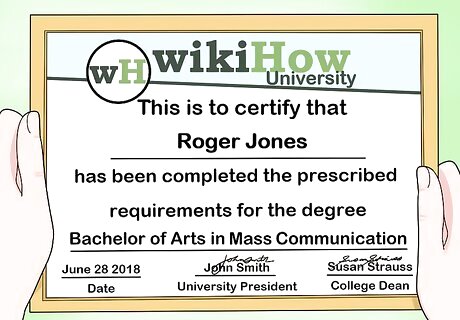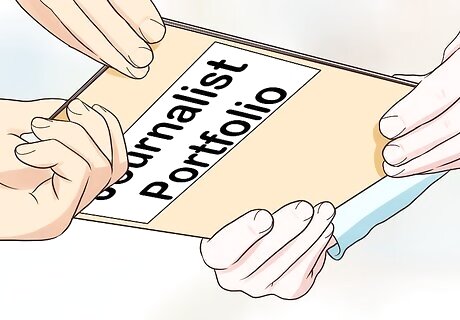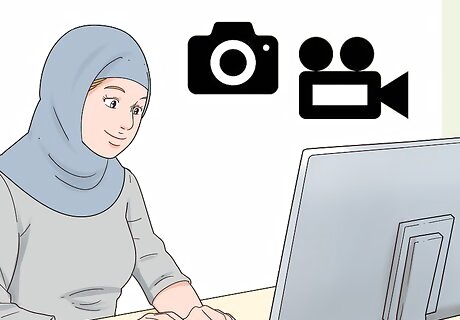
views
Getting a Journalism Education

Get involved with student publications. This is a clear first chance for students who are interested in a journalism career. In middle school, high school, and even college, look for publication opportunities in your school setting. Start out taking whatever assignments are open and work your way up to an editor position. Don’t feel as if you have to focus solely on one publication either. For example, school newspapers, literary magazines, or yearbooks all provide great learning opportunities for budding journalists.

Pursue a journalism degree for in-depth training. Getting a journalism degree from a college or university is a great way to gain practical knowledge and experience. Most degree programs will require that you take classes and complete at least 1 internship as well. Some programs even have placement systems with journalism companies.

Take classes outside of your major. Enroll in science, math, or business courses. Look for another subject that interests you. Gaining additional academic experience will make you a better journalist because you will be able to understand more fully what you are reporting.

Write for local publications while you’re still in school. Investigate which organizations in your area print newsletters or even newspapers. Then, use the contact information found in the publication to reach out to the editors. Send them a professional email or make a phone call inquiring about any available opportunities. For example, if a church group in your city prints a weekly newsletter, they might welcome your help and experience.
Gaining On-the-Job Experience

Start out as a clerk or office staff member. Accepting a base-level job with a journalism bureau or company is a great way to get your foot in the door and gain experience. Look for jobs where you’ll get to know how the office operates. You may also be fortunate enough to get promoted in time. For example, many journalists start out as community reporters at local publications. After some time, they move up into more specialized reporting positions.

Do an internship to start getting on-the-job experience. This is an obvious entry point into a journalism career. Look for ads posted on journalism websites, job sites, and through university programs. Some internships are paid, while others are not. The length of time for internships varies quite a bit as well. Pay close attention to the internship requirements, too, as the tasks that you perform may vary a great deal. As an intern, you might be asked to do background research for a story. Or, you might contact people mentioned in a story to verify quotations or other statements. Some schools also give credit for internships. Talk with your school counselors about whether or not an internship can count for credit.

Shadow a working journalist. Contact your local newspaper or television station and ask if they allow shadowing. Then, see if they can direct you to a particular journalist who might be open to this possibility. Shadowing will require that you follow 1 or more journalists around and try to observe their daily work activities and practices. You could shadow a person for hours or even months, depending on what works best for everyone. To take full advantage of this opportunity you’ll want to ask lots of questions. It’s also important that you listen and absorb as much as possible.

Start your own print publication, podcast, blog, or website. If you don’t see an opportunity working for a student publication or if you are out of school and need more experience, consider venturing out on your own. Pursue your personal story interests. Create write-ups and post them on a website or blog. Or, read them aloud for a podcast. Use social media avenues, like Twitter, to publicize your stories. To start a website or blog, you’ll need to find a host site. You can also post your podcasts to a personal website or upload them to YouTube.
Making Professional Contacts

Follow and learn from industry role models. Spend time reading, listening to, or watching the genre of journalism that interests you. Look for particular people whose approach you admire and who you’d like to model yourself after. Send a quick and professional email to them. You might strike up a professional friendship with an experienced journalist who can provide you with a ton of guidance. For example, in your introductory email, you might write, “I’m a student of journalism at NYU and have admired your work for the last four years.” It’s possible that the journalists that you contact may not be able to respond right away (or ever). Don’t get discouraged if you don’t hear anything.

Secure strong references from professors or former supervisors. To land even an introductory position, you’ll need reliable references with journalism experience. If you are in school, your professors will often serve as your references. Talk with your references about your professional interests and see if they have any leads that will give you more experience. References can also come from supervisors from other jobs, even if they’re not directly related to journalism.

Network all the time. When you are out on a story, pass out your business cards freely. Keep in touch with other journalists from your degree program and see where they landed. Talk with more experienced journalists and ‘pick their brains’ for advice. Consider every person a potential source for knowledge. You can also network online via professional sites, such as LinkedIn. For example, start a conversation with a new acquaintance by asking about their current projects. You can also find a common acquaintance and use that connection to open up conversation. If you’ve enjoyed talking with a person, follow up via email or phone.

Go to professional conferences. Get involved with a group, such as the Society for Professional Journalists. Choose your membership and conference attendance carefully, as these activities can be costly. But, they are also valuable opportunities to network and to hear about new professional opportunities, such as internships. You can find professional groups by talking with your mentors and paying attention to the groups that other journalists belong to. Most groups are open membership and do not require invitations.

Create a portfolio to show employers your strengths. A portfolio is a collection of your work that you can show to others. Most journalists create both digital and paper portfolios. They’ll print out clips from their articles and/or post them to LinkedIn or a personal website. The best portfolios feature a variety of articles while also demonstrating your ability to specialize in a certain subject or area. If you don’t have many published clips, that is okay. Fill your portfolio with your own articles that show off your writing style and approach.
Developing Your Journalism Skill Set

Develop a specialty. Focus on a subject that interests you and report on it extensively. Try to learn that particular area from top to bottom. If you are in school, take another major outside of journalism, such as science. This will give you expertise in a reporting area and an advantage that others may not have. For example, you could focus on reporting on war or conflict. To specialize even further, you might target a particular area or population.

Work outside of your thematic comfort zone. At some point, any experience is good experience. If you are just starting out, don’t be afraid to take on assignments that will require a bit more effort on your part. You’ll create a more diverse portfolio, impress others with your willingness to branch out, and maybe find a specialty area that you enjoy. For example, if you are a business reporter, that may mean taking on a story about a small-town entrepreneur instead of covering all national corporations. Volunteering for stories outside of your standard fare may also gain you the appreciation of your editor or producer.

Take your time with each story. You may be eager to make your mark, but don’t rush your work on stories. Spend those extra minutes researching the background details. Write up extra questions in case your interview subject is very willing to talk. Don’t overlook the little details, as this will help you to stand out.

Hone your expertise with camera or video. Take classes to develop your camera or video skills either online or in-person. Get up-to-date software on your computer and practice image editing in your spare time. You can also experiment with sharing your videos or pics on social media.



















Comments
0 comment